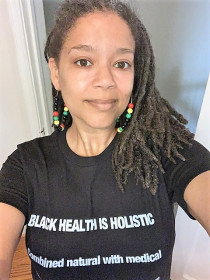
Kimya Nuru Dennis
Connect with Kimya
About Kimya
As a community advocate, educator, and qualitative researcher, Dennis’ research focuses on racial and ethnic justice, socioeconomic justice, health justice, gender justice, sexuality justice, and reproductive justice for minoritized and underserved people. She collaborates with — and contributes to — communities, organizations, and K-12 schools and colleges-universities to improve materials, resources, services, and consistent outcomes. This includes cultural-collective-community-family health outreach; teaching and training medical and health students and professionals; job skills and economic development; cultural-collective-community-family education outreach; changing school curriculum and course materials; and conducting 6-month or annual assessments for policies and results.
Contributions
The Complexities of Black Youth Suicide
Debunking Myths about Mental Illness among Blacks
No Jargon Podcast
In the News
Publications
Explores the educational experiences of Black women who recently obtained graduate degrees from Predominantly White Institutions. Provides concrete and practical strategies to systematically support Black women graduate students and relieve them of the burden of self-reliance.
Places academia within an artistic landscape and addresses how Black women junior faculty create artistry and artistic expression, handle perceived obstacles, and use their voices to enact change.
Contributes to the study of relationships between socioeconomic status, sociopolitical status, directions of lethal violence, and suicide.